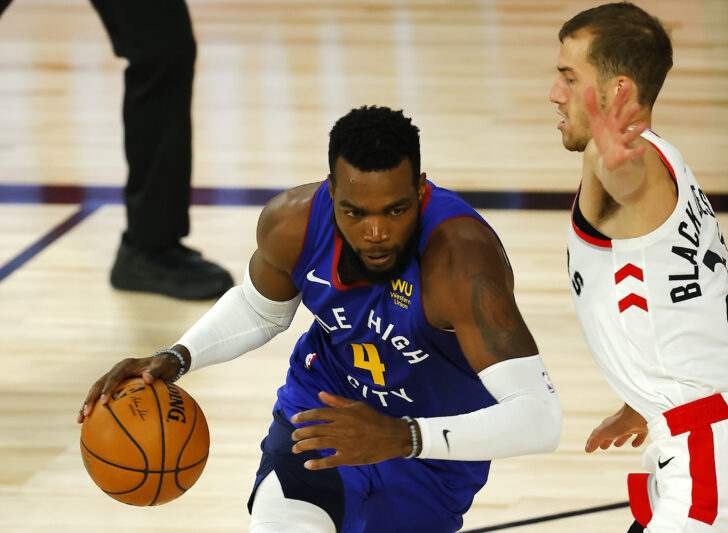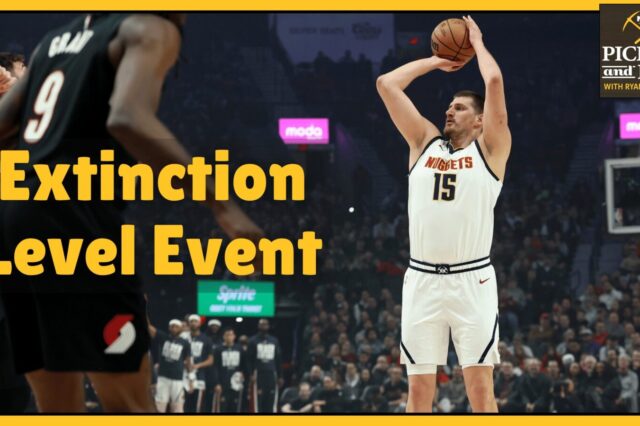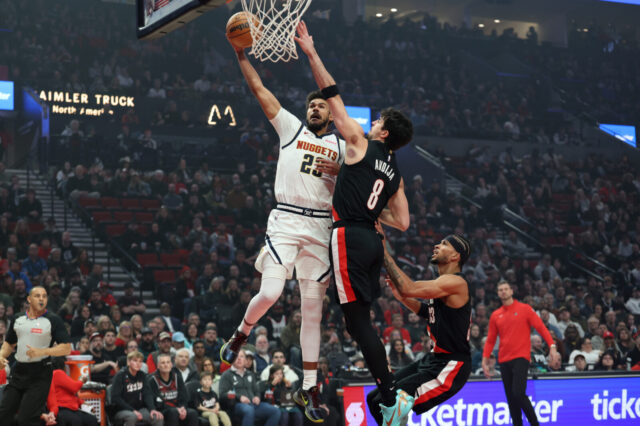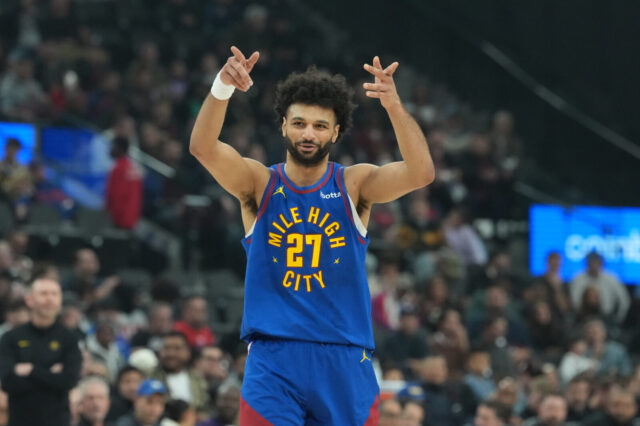The time to prepare for the playoffs is now over for the Denver Nuggets.
With all eight seeding games concluded, the Nuggets have learned all they can. They are now locked into the third seed in the Western Conference and will be taking on the Utah Jazz. With the first game of the first round of the 2019-20 playoffs set to tip off just about 48 hours after Denver’s last game, there is very little left to do before finally diving into the postseason.
So what did these eight seeding games say about the Nuggets? Well let’s take a closer look.
Here are my eight takeaways from the Nuggets eight seeding games.
1. These injuries are not going away any time soon
This is by far the most clear takeaway after Denver’s eight seeding games.
At this point, there is no indication when — or if — Gary Harris or Will Barton III will return from their injuries. Harris has yet to play a single minute across Denver’s three scrimmages or their eight seeding games while Barton only logged a total of 18 minutes in Denver’s third scrimmage and has yet to be active for the Nuggets since.
Harris has been battling what is labeled as a right hip muscle strain. That is concerning considering that it is yet another lower body injury that has led to him missing significant time which has been a constant trend for the last four years. At this point Harris’ injury history is entirely unavoidable. He has played more than 57 games in a season only one time since the 2015-16 season and in 2019-20 he missed 17 of Denver’s 73 regular season games in the shortened season with no indication he will be ready for the playoffs.
Barton had avoided injuries his entire career up until last season when he had to have surgery on his core muscles derailing what was building up to being a career-best season. He returned for the 2018-19 postseason, but was unable to play at his best being that he was not in game shape or in a rhythm. Barton took time to get healthy all offseason which led to him finally enjoying the career-best season he felt robbed of a year prior, but is now once again being derailed by an injury. He is fighting through right knee soreness and has not been active since playing in Denver’s third scrimmage.
Hopefully Denver can get both of Harris and Barton back and on the court, but at this point the Nuggets need to move on as if they will not be getting them back from injury. They have not spent time getting on the same page with their teammates. Because of that, the Nuggets need to work with who they have available and get a playoff rotation set. Unfortunately that is just the reality Denver — as well as Harris and Barton — is facing.
2. Injuries are a concern, but it gave Denver a chance to evaluate the talent already on their roster
While these injuries have left the Nuggets searching for answers for most of their time in the Orlando bubble, there is a positive that could end up being a turning point for the Denver Nuggets franchise.
Being without their starting shooting guard and small forward left Malone searching for reliable starters. Naturally, Malone turned to Torrey Craig to start at shooting guard being that he filled in for Barton during the 2018-19 playoffs and started 11 games. The trust developed between the two of them is undeniable so his inclusion is far from surprising. But at the small forward position, Malone made a risky, but calculated move by starting Michael Porter Jr.
I know calling the decision to start Porter ‘risky’ is easily argued, but that is only true with retrospect. At the start of Denver’s eight seeding games, Porter was one of the last members of the roster to arrive in Orlando, he was coming off of an ankle injury that he tweaked again during his quarantine back at home with his family, and he had incredibly inconsistent minutes before the suspension of the season. Additionally, he is a rookie and Denver has championship aspirations. Sure, Porter has always had the skill to help Denver in that environment, but was he mentally and physically ready to be a full-time starter for the Nuggets in the playoffs? I would say that question would have been a resounding ‘no’ before the seeding games took place.
Despite all of that, Malone chose to start Porter at small forward and was immediately repaid with some incredible performances. In Porter’s second start in the bubble, he had 37 points and 12 rebounds for his first of four-straight 20-point double-doubles. By the time the eight seeding games ended, Porter came away with averages of 22 points and 8.6 rebounds per game while shooting 50% from the field and 42.2% from three-point range.
While Porter’s ascension means much more Denver’s overall playoff potential, he was not the only young player allowed time to shine because of injuries. Bol Bol and PJ Dozier both managed to display their ability to help the Nuggets now and in the future.
Dozier’s play has been strong ever since he arrived in Orlando — albeit a bit later than the rest of his teammates. He has shown a strong instincts as a passer in the pick and roll, has been using his seven-foot wingspan to his advantage on the defensive end of the floor and has sprinkled in some three-point shooting as the cherry on top of his strong play. With Harris and Barton still out for the foreseeable future, Dozier will have to be relied upon for a larger role in the playoffs more than originally anticipated which makes his strong play even more important when looking ahead to the playoffs.
For Bol, things are a little bit less immediate, but he has the potential to be just as important if not even more so. Bol showed he can be a game-changing threat just by stepping on the floor on both ends of the court. Malone had the creative thought of playing a zone defense around Bol when he is in the game which has allowed Bol’s shot blocking and defensive ability to shine. Bol was only credited for six blocks in the seven seeding games he played, but he constantly altered shots at rim and also against jump shooters. His ability to close out and use his nine-foot-eight standing reach intimidated offensive players from the three-point line all the way down to the rim. On offense, Bol showcased his feathery touch on his jump shot as well as his offense rebounding potential, but what took so many by surprise was his passing and ability to handle the basketball. Bol had multiple near full-court passes for assists during his action in Orlando and even broke down defenders with his handle on a couple occasions which led to dunks at the rim.
There is no telling what the future holds for Bol, but his play in Denver’s seeding games reminded the rest of the league that Denver has yet another possible star player waiting for his chance.
3. Michael Porter Jr. has arrived and his chemistry with Nikola Jokic is potentially devastating for opposing defenses already
Let’s go back to Porter for a second because his play is likely the most monumental development during Denver’s time in Orlando so far.
Not only was he able to score at will anywhere within 30 feet of the rim, but he did so in a way that did not require forcing shots. Porter was a sniper as an off-ball three-point shooter. He was impossible to guard as a cutter due to his size and mobility. He can create an open shot in the post with smaller defenders on him at any point. Oh, and was a terror in transition. Him becoming that type of a threatening offensive player fundamentally shifted the way opposing defenses planned for the Nuggets and made life significantly easier for everyone else sharing the court with him. When he was out beyond the three-point line, there was more room for cutters on his side of the floor. When he was in the post or the dunker’s spot, he would drag the defense to him opening up passing lanes to open three-point shooters. He has a court-warping presence when on the floor which Denver did not have prior to the suspension of the season.
And that is all before talking about just how dangerous he was in the two-man game with Jokic.
When Porter shared the floor with Jokic, opposing defenses were stretched to their limit. They could not help off Porter because of the threat of his jump shot, but if you don’t help when Jokic is in the post, he will score nearly every time down the floor. Not to use this term repetitively, but again, that is a floor-warping quality that Porter provides that was non-existent for Denver prior to the hiatus.
What really injected fear into opposing defenses was when Porter would use a Jokic screen to run a pick and roll or dribble handoff. There is no shortage of issues that arise for opposing defenders when they are defending those looks by Porter and Jokic because there is always a way for them to hurt teams. If opposing defenders fight over the Jokic screen to keep Porter from shooting, Porter can get downhill and play two-on-one with Jokic. If defense go under the screen, Porter can pull up and splash a three behind the Jokic screen. If defenses hedge out to contain Porter, Jokic can slip and get the ball on the short roll while forcing the defense to scramble. If you switch it, you have a wing defending Jokic in the post. Unless there are two elite and versatile defenders on both Jokic and Porter, that is a matchup nightmare at all times from anywhere on the floor.
These are just a few of the ways Porter impacts the offensive flow of the game for Denver and provides them with even more firepower, but things don’t stop there because Porter has also proven to be a potential impact defender as well.
Porter is no where near complete on the defensive end and is massively behind when compared to his offensive impact, but that doesn’t mean he is a red flag. Porter has given strong effort more often than not which has unlocked a new wrinkle for Denver’s defensive scheme. Having a near seven-foot small forward adds so much length that teams will have to think twice about shooting when he is closing out. Additionally, Porter has proven to be a capable weak-side rim protector which helps his productivity on defense. Lastly, he gives the Nuggets yet another strong defensive rebounder to finish defensive possessions.
Michael Porter Jr. has arrived and the Nuggets are much more dangerous because of it.
4. Bol Bol play could play in the postseason
Ok, this is a bit of a Hail Mary, but it does seem that Bol has earned some trust from Malone to the point that maybe, just maybe, Bol could be used sparingly in the postseason.
So let’s start with why this is unlikely to happen and get it out of the way. The first and most obvious reason is that for all of Bol’s incredible skill, he has just as many red flags and ways to attack him. If Denver puts him on the floor against any strong and smart offensive player, he is going to be attacked relentlessly until he is taken off the floor. With Bol on offense, opposing teams can use bruiser type forwards to push him off his spots and make him uncomfortable. Those issues are real and will not be going away any time soon.
But on the other hand, there are some very interesting options that Bol presents to the Nuggets bench unit if they are in need of an energy injection.
The first wrinkle Bol could provide the Nuggets is a great change-of-pace defensive center. If Denver is getting scored on at the rim, inserting Bol and using a zone defense — like they have a few times in Orlando — can dramatically shift the momentum of the game. On the other side of the court, if Denver’s bench unit is starved for shooting one night, getting Bol in for a brief stint as a pick-and-pop threat is an incredibly effective look considering Bol’s height, shooting touch and release point.
The odds are still against Bol being used in the playoffs, but that doesn’t mean there isn’t a specialized role for him if Malone chooses that is what is needed. Bol’s strong play in Orlando has earned him consideration to be used in the playoffs.
5. Jerami Grant is Denver’s not-so-secret weapon in the postseason
Again, as a byproduct of the injuries Denver has dealt with since arriving in Orlando, Grant has been a beneficiary of an increased role, but it doesn’t stop there. Malone opened up Grant’s role on the floor not only in terms of minutes, but also in terms of importance and responsibility.
For the first time this season, the Nuggets were looking to create mismatches by getting smaller defenders switched onto Grant and letting him post them up. For the scrimmages and first few seeding games, opposing defenses let Grant go to work and that decision proved foolish as Grant racked up easy points consistently. Because of that, defenses have adjusted which has allowed Grant to show off a little bit of his passing skill when he draws two defenders. Those offensive skills paired with his strong three-point shooting has ultimately made him a much bigger threat on the offensive end of the floor that he was before the hiatus and gives him more credence as a small forward.
There is no doubting that his expanded offensive game will help Denver in the postseason; especially when playing at small forward or alongside Porter. When either of those situations reveal themselves, Denver almost always has some advantage to exploit. That should, in theory, make their half-court offense even more deadly in the postseason.
Really though, Grant’s offensive skill set is not what makes him such a weapon for Denver in the postseason. The place where he will make his biggest impact is on the defensive end of the floor.
There is no one on the Nuggets roster as physically and mentally equipped to defend the elite forward in basketball like Grant is and he has proven that in moments during Denver’s seeding games. Most recently, he did a fantastic job of making Kawhi Leonard and Paul George’s jobs difficult when Denver faced off against the Clippers and he had a similar effect on Anthony Davis and LeBron James of the Los Angeles Lakers. Grant also has experience with that role because in the playoffs last year for the Oklahoma City Thunder, he was tasked with defending Leonard and did a productive job of it.
There is no one on earth who can fully lock down any of those superstar players for 48 minutes, but Grant gives Denver a foundation that they did not have last year or in years past. That makes their margin for error larger in a very meaningful way.
6. Jamal “Big Guard” Murray is no longer just an Instagram caption
Murray has dealt with a nagging injury of his own since being in Orlando, but once he made his way back to the starting lineup, it was clear that what was seen on his Instagram was indeed true: Jamal “Big Guard” Murray has added quite a bit of muscle and it immediately paid dividends once he took the court for the resumption of the season.
While the tales of players adding muscle is almost always overly-embellished, Murray’s case seems to be the opposite. Not only is he clearly larger and stronger, but even more so than many expected and that increased strength has manifested itself in multiple different facets of his game.
First, and most importantly, Murray is clearly handling defensive duties better than he has before. Whether he is just channeling all the energy he stored during the hiatus or if this is a newly-inspired Murray on the defensive end of the floor is till to be determined, but it is clear that when Murray puts his mind to stopping whoever he is defending, he is more equipped now than he has ever been before. He is battling through screens more effectively, has stonewalled the likes of Kawhi Leonard in the post, and has been able to contest shots at the rim with more of an impact. Additionally, it has helped him as a defensive rebounder as evidenced by his 12 rebounds in Denver’s double-overtime win over the Utah Jazz. If Murray has truly improved defensively based on his increased strength, it takes away a mismatch for opposing teams to take advantage of. In the 2018-19 playoffs against the Portland Trail Blazers, Rodney Hood posted up Murray with great success and that battle was a large difference maker in what ended up as a seven-game series loss for the Nuggets. If teams can no longer target Murray as effectively in that way, it bodes well for Denver’s chances to defend better in the postseason than they did last time around.
On offense, Murray has seen his increased strength help as well. His ability to take contact at the rim is clearly improved as is his ability to move defenders when operating off-ball or as the initiator. Simply stated, Murray is having a much easier job of getting where he wants to be on the floor which has not always been a strong suit for him.
Murray’s increased strength is real and has helped his game and the Nuggets as a team. Hopefully those trends also continue into the playoffs.
7. Paul Millsap is going to need to carry a heavy defensive burden in the postseason
When Nuggets head coach Michael Malone called the Nuggets defensive impact “embarrassing” after their final seeding game before the playoffs, that is quite the cause of alarm.
After their eight games in the bubble, the Nuggets have the worst defensive rating of the 22 teams taking part and by a large margin. There is no getting around the fact that Denver’s defense is a massive issue and their inability to correct their mistakes during their seeding games has turned Malone’s new hairstyle a lighter shade of grey.
There are many reasons Denver’s defensive impact has been lacking in a major way. Opposing teams have shot the lights out from three-point range against the Nuggets which has the potential to skew the numbers over such a small sample size, but regardless of that possibility, their issues defending shots from beyond the arc has destroyed their defense. To pour salt in the wound, Denver’s turnover issues have fueled opposing teams in transition which makes their defense exponentially worse as well.
Maybe the Nuggets had trouble keeping focused during so many games without high stakes and maybe Paul Millsap was right when he told the media that he believes his team knows what they need to do defensively in the playoffs, but if that part ends up proving to be untrue, where does that leave the Nuggets?
It leaves them depending on Millsap to save the day.
For as good as Grant can be playing multiple roles on defense, he doesn’t have the same understanding of where to be or how to throw off opposing offenses. Porter may have the length and mobility to be disruptive, but he is still learning how to use his skills on the defensive end of the floor. Torrey Craig is a great one-on-one defender, but he can’t erase all of the mistakes of others.
That leaves Millsap with the task of finding a way to glue all of these different pieces together and mold them into a functional and sustainable defense. Oh, and he only has two days to do it.
That is quite the burden to bear, but if anyone has the mental and physical skills to make it happen, it is Millsap.
8. The Nuggets playoff ceiling is higher right now than it was before the hiatus
This might be the most startling of these eight takeaways from Denver’s eight seeding games.
Yes, they are without two starters in Harris and Barton, but somehow that reality led to enough experimentation that Denver suddenly has more tools at their disposal to attack teams in the postseason.
As stated above, Grant’s expanded offensive game has given Denver more versatility which makes them unpredictable on offense. In all likelihood, if Denver had their full complement of guards, Grant would not have had the room to expand his game like that and show his head coach that those particular skills can help his team.
Still, nothing raises Denver’s ceiling in the postseason like this newly-actualized version of Porter. The way he spaces the floor on offense thanks to his outside shooting while also becoming Jokic’s favorite target as a cutter has forced opposing defenses to bend in a way that they have not had to before when playing the Nuggets.
Now let’s compare the roster construction with and without Harris and Barton. Normally Denver chooses to play small with Barton playing small forward and Harris joining Murray in the starting back court. While both Harris and Barton have shown they can handle the defensive responsibilities of playing small, it has on many occasions left the Nuggets at risk. Now with Craig and Porter in the starting lineup instead of Harris and Barton, you add a more skilled offensive player in Porter over Barton and a similarly impactful, but bigger defender with Craig over Harris. If Porter can continue to shoot the way he was able to in the seeding games, Denver’s starting lineup suddenly has more firepower on both ends of the court.
Of course when a team loses two starters, they also lose two bench players being that someone has to fill out the starting five. Now Denver is forced to rely on Dozier more than they have before which has thrust him into an important bench role during the playoffs. Still, bench play is generally less important in the playoffs being that starters play more minutes so maybe those issues won’t come back to burn the Nuggets.
From that perspective, Denver is now more equipped to deal with any potential playoff opponent than they have been during this iteration of the franchise. Whether or not that translates to more playoff success is still up for debate, but Denver is clearly more talented and prepared for the playoffs today than they were when they took on the San Antonio Spurs for their first playoff series last year.



